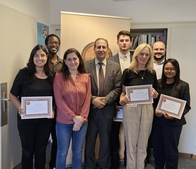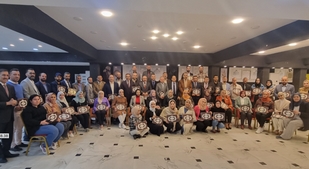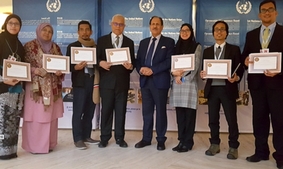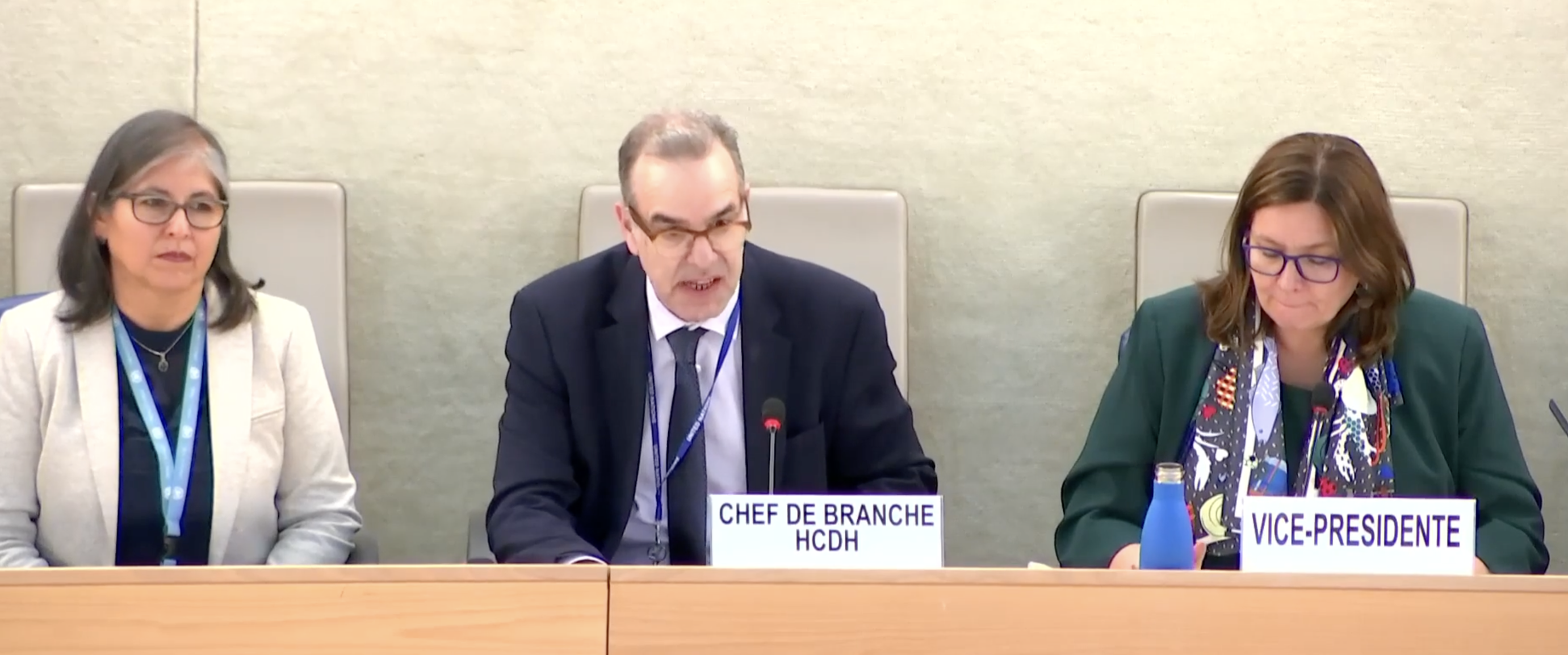GICJ Training Course in International Law, International Humanitarian Law, and International Human Rights Law
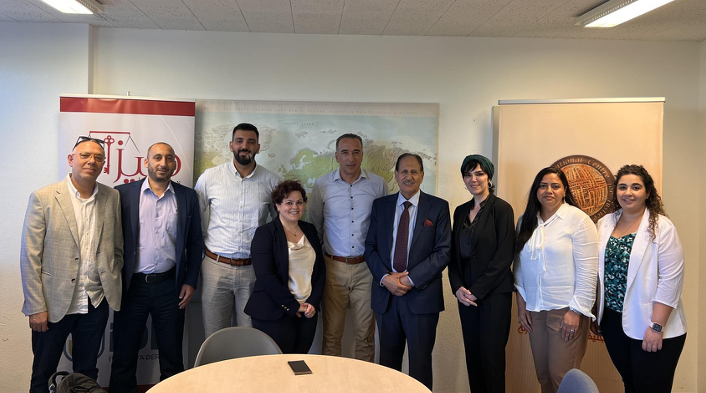
Geneva International Centre for Justice (GICJ) organised three training workshops on International Law, International Humanitarian Law, and International Human Rights Law from the 2nd to the 27th of October 2023.
Conducted in Geneva, Switzerland, the training was designed to further deepen the knowledge and experience of the trainees on the United Nations’ creation, international law’s evolution, human rights law development, key instruments, and how treaty bodies oversee convention implementation. The training also delved into understanding international humanitarian law, emphasising vital provisions in four Geneva Conventions and their protocols on protection rules and individual rights.
Training at GICJ office
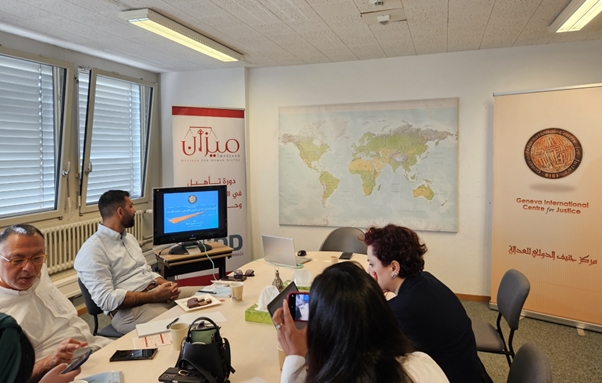 Expanding on the United Nations' human rights mechanisms during subsequent presentations, the Executive Director of Geneva International Centre for Justice, Mr. Naji Haraj, delved into the roles and functions of several key entities. These included the Office of the United Nations High Commissioner for Human Rights (OHCHR), the Human Rights Council (HRC), and the Special Procedures. In this context, significant emphasis was placed on the vital contributions of Non-Governmental Organisations (NGOs) within the UN system and their potential collaborations with UN bodies, particularly those engaged in the realm of human rights.
Expanding on the United Nations' human rights mechanisms during subsequent presentations, the Executive Director of Geneva International Centre for Justice, Mr. Naji Haraj, delved into the roles and functions of several key entities. These included the Office of the United Nations High Commissioner for Human Rights (OHCHR), the Human Rights Council (HRC), and the Special Procedures. In this context, significant emphasis was placed on the vital contributions of Non-Governmental Organisations (NGOs) within the UN system and their potential collaborations with UN bodies, particularly those engaged in the realm of human rights.
The training session proceeded with a thorough examination of the mandates and compositions of the UN's human rights mechanisms. This exploration began with a deep dive into the responsibilities and mission of the High Commissioner for Human Rights and their office. Notably, considerable attention was dedicated to unravelling the operational structure and functions of the UN Special Procedures, highlighting the distinctions between various mandates and the methodologies employed by mandate holders in executing their duties. Mr. Haraj also elucidated how NGOs and civil society can engage with Special Procedures mandate holders to raise concerns, request actions such as country visits, and advocate for the inclusion of specific issues in reports presented to the Human Rights Council.
Continuing the theoretical presentation on human rights mechanisms, the trainees were furnished with extensive insights into the workings of the Human Rights Council. This comprehensive overview covered the legacy of its predecessor, the Human Rights Commission, as well as the circumstances that paved the way for the establishment of the Human Rights Council in 2006. Detailed information pertaining to the Council's mandate, permanent Agenda, composition, regular and special sessions, decision-making processes, the involvement of NGOs in the Council's proceedings (both prior to and during sessions), and the mechanisms by which NGOs could submit written and oral statements were also presented.
Visit to International Red Cross and Red Crescent Museum
On the 5th of October, participants had the privilege of visiting the International Red Cross and Red Crescent Museum. They were cordially welcomed to an informative digitel guided tour of the permanent exhibition titled "The Humanitarian Adventure." This exhibition delves into contemporary issues through three distinct spaces: "Defending Human Dignity," "Restoring Family Links," and "Reducing Natural Risks." Within "The Humanitarian Adventure," attendees had the opportunity to trace the evolution of humanitarian efforts, following the profound impact of Henry Dunant's reflections, the 1864 Geneva Convention, and the establishment and growth of the Red Cross.
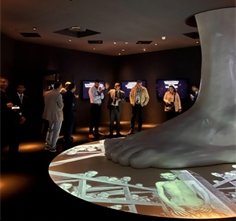 |
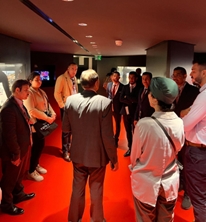 |
In the "Human Dignity" section, visitors could witness the persistent struggle for the preservation of individual life and integrity. They could explore the concepts and challenges surrounding the respect for human dignity through cultural artifacts, gaining an understanding of the imperative need for ongoing vigilance in the face of emerging crises and challenges.
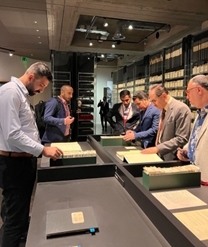 |
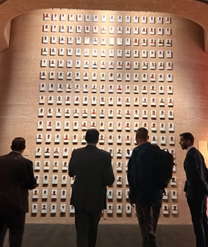 |
In "Restoring Family Links," participants delved into the idea of humans as inherently social beings, whose identities and stability are intertwined with their connections to others. When these connections are severed, fundamental elements of individuals' lives are disrupted. The exhibition vividly portrayed the critical importance of sharing and receiving information and reuniting with loved ones, particularly in times of crisis.
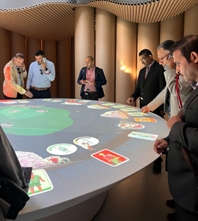 |
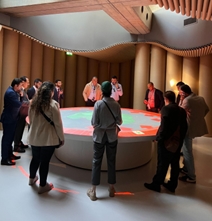 |
Within the "Reducing Natural Risk" area, participants engaged in a collective endeavour to take action aimed at saving lives and safeguarding resources in the face of natural disasters. This interactive experience highlighted human resilience and adaptability when confronted with natural calamities and epidemics.
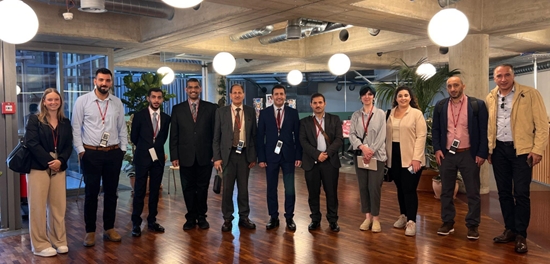
Visit to 54th Session of the Human Rights Council at the United Nations
During the training, the group visited the UN Office in Geneva and attended the 54th Human Rights Council session during the discussions of the General Debate for Item 7, on the Human rights situation in Palestine and other occupied Arab territories. Here, the participants had the opportunity to experience the interaction of UN stakeholders, Member States, and civil society representatives in the discussions.
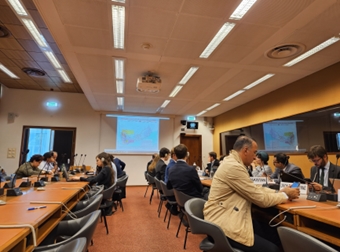
To experience one pertinent way of NGOs’ contribution to the Council, the group attended a side event on Yemen on the 5th of October. During the event, the trainees got acquainted with the way in which panellists share their insights, discuss human rights situations in the respective States with the audience, and develop recommendations. At the concluding part of the side-event, the training participants actively engaged with the panellists and offered their own insights and recommendations to improve the human rights situation.
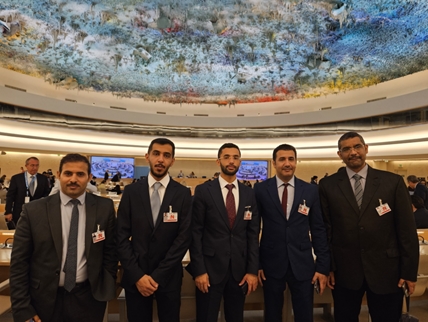
To further the knowledge and experience of the trainees at the Human Rights Council, they had the opportunity to create an oral statement for the General Debate on Item 7 for the Human rights situation in Palestine and other occupied Arab territories. The trainees collectively worked together to create a statement highlighting the challenging living conditions of the Palestinian people due to the ongoing Israeli occupation.
It points out several violations, including land confiscation, home demolitions, and seizures of Palestinian properties. Additionally, it mentions the continuous restrictions on religious practices in Al-Aqsa Mosque and the Church of the Holy Sepulcher. The trainees questioned Israel's claims of being a democratic state that upholds rights and freedoms, while simultaneously committing violations against the Palestinian population. They draw attention to the high number of political prisoners, including administrative detainees held without trial. The practice of detaining individuals under the pretext of secret files and indefinite extensions is criticised for its lack of transparency and justice. The statement also underscores the plight of Palestinian children imprisoned instead of receiving an education. Furthermore, it highlights the issue of bodies being held in occupation refrigerators, which is seen as collective punishment for families deprived of dignified burials. The statement points out incidents in camps like Jenin, where raids, violence, and destruction have occurred, with support and protection from the Israeli government and military for settler attacks on Palestinians and their property.
Additionally, during the General Debate of Item 9 of the Human Rights Council, the trainees gained valuable insights into the ongoing issues surrounding racism, racial discrimination, xenophobia, and related forms of intolerance. The discussions revolved around the follow-up to and implementation of the Durban Declaration and Programme of Action. It was a significant learning opportunity for the participants, as they had the chance to witness numerous non-governmental organisations (NGOs) passionately addressing the pervasive oppression and segregation faced by the Palestinian people.
In many instances, these NGOs drew striking parallels between the situation in Palestine and the historical Apartheid regime in South Africa. This comparison highlighted the severity of the challenges faced by the Palestinian population, emphasising the urgent need for international attention and action to address these issues. The trainees left the General Debate with a deeper understanding of the complexities surrounding these human rights concerns and a heightened awareness of the critical role that the international community plays in promoting justice and equality.
Concluding Ceremony
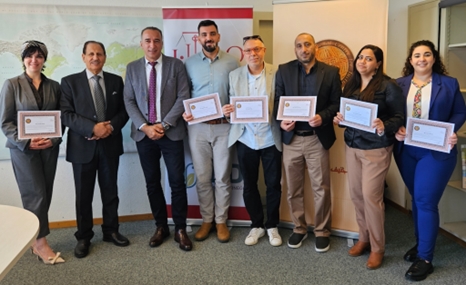
In the concluding segment of the training, the group had the opportunity to engage with GICJ, exchanging thoughts on the course content and its most pertinent facets. Furthermore, the participants were invited to assess the training methodologies and the knowledge they had acquired. The trainees expressed their profound appreciation for the training, characterising it as a unique experience that provided them with profound insights into the UN system and its human rights mechanisms. They unanimously acknowledged the relevance of the information and knowledge acquired in the context of their professional responsibilities. GICJ extends its gratitude for the valuable suggestions that will contribute to the ongoing enhancement of the training program.
To culminate the training, a closing ceremony was arranged, during which each trainee was presented with a certificate in acknowledgment of their successful completion of the workshop on International Human Rights Law and Human Rights Mechanisms.
Read previous articles on GICJ trainings below




